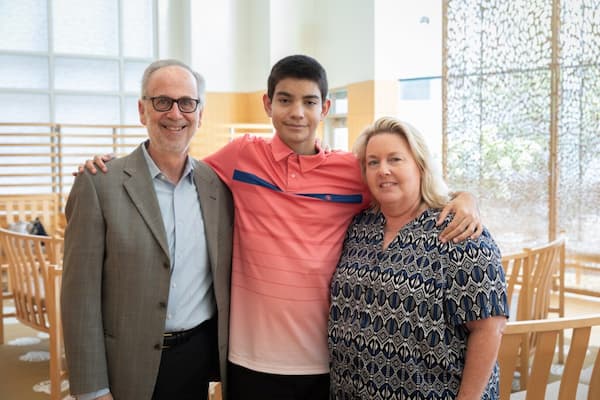“I can do this” -- how 400th kidney transplant recipient kept fighting

After driving through the night with no sleep, John Paredes just wanted to get there.
“I was nervous, excited, waiting for the car ride to be over.”
The 19-year-old was traveling from Oklahoma City with his parents to Children’s Mercy Kansas City — a five-hour journey – because he had just received notice a new kidney was waiting for him. This was a call for which his mother, Denise, had waited so long.
“I remember thinking, ‘I wonder what it’s going to feel like when that call comes,’” Denise said. “It was more surreal than anything.”
The past several years had been surreal and then some for the whole family. John was a healthy 13-year-old in 2017 when he noticed something was wrong. Lab tests revealed his kidneys were failing due to a condition known as granulomatosis with polyangiitis (formerly Wegener's granulomatosis), a rare disorder that causes inflamed blood vessels.
“The weight of the news kept getting heavier,” John said. “It made me depressed and anxious.”
Despite the years of health challenges, John finally got that important call and arrived at Children’s Mercy, where he received a kidney transplant on June 23. It was the hospital’s 400th kidney transplant, a milestone celebrated not only by the team but also by his doctor, Bradley Warady, MD, who established the program in 1984 and has been a part of all 400 transplants.
“When I look at the list of kids who have received transplants, there are so many great memories,” he said. “At the same time, it doesn’t seem that long ago that we did transplant number one.”
John’s surgery was a success. Now the young man who always wanted to follow in his surgeon grandfather’s footsteps is ready to stay away from operating rooms for a while.
“For now, I just want to go home and take care of my two crazy dogs,” he said.
One of his surgeons shared, “I knew him (John) from Cincinnati with his pancreas surgery and multiple admissions and being very sick. He is a trooper. I was happy to see him at Children’s Mercy and was privileged to perform his kidney transplant. Not only did he have a great continuity of care, but he also pulled through some major illnesses to get to a kidney transplant. And with his gift of life, I hope he goes on to live a full and productive life.”
John is also looking forward to a fall full of activities he loves, like hitting up the haunted houses, as well as simple pleasures like dinner with his family without “being hooked up to machines.” He shares this advice to other kids facing the same long road:
“Make sure you have the will to say, ‘I can do this. I don’t care what you throw at me, I can do this.’ That’s what you need to get off the ground. And Children’s Mercy will give you that in spades. I’m so glad to be here and have those things.”
His mother also breathes a well-deserved sigh of relief after watching her son struggle for so long — enduring countless surgeries, ICU stays, and the persistent and unsettling dread of an unknown future.
“I look forward to him figuring out what he wants to do next,” she said. “I’m terrified of Mother Nature and what can be taken from him, but I’m not concerned about John. He’s one of the soldiers who’s been at war.”
She said she’s grateful to the Children’s Mercy team for their collaboration, which “allowed him to get the best care,” and especially the nurses, who provided much-needed emotional support to her and her husband.
One of John’s nursing coordinators, Nicole Fenton, RN, BSN, CPN, said, “I’ve had the privilege to know John and his family through some of their worst days at Children’s Mercy. The endurance, determination and care that John and his family have has been a truly remarkable sight. We have had some really long nights. It’s great to finally see John’s pain under control how much his new kidney has impacted his life.”
John’s post-transplant coordinator, Madison Ince, RN, BSN, CPN added, “I’ve had the opportunity to follow John through much of his journey, from peritoneal dialysis to home hemodialysis. I now have the pleasure of caring for him post-transplant as his coordinator. It’s rewarding to be a part of his journey and to witness what this tremendous gift of donation has done for John and his family. “
Much of the credit, John’s mom said, goes to John himself and his courage through it all.
“We leaned on John,” she said. “I took my cues from him. One minute, one hour, one day at a time. If we can get there, we can get to the next thing. Surviving.”
